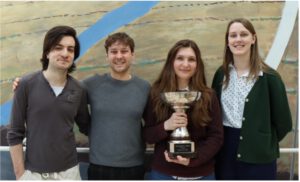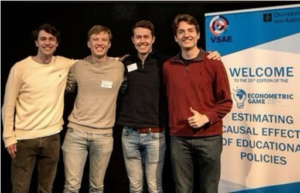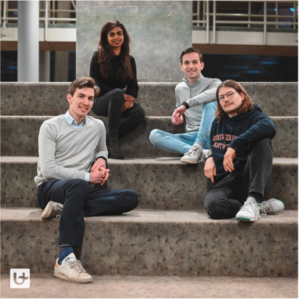The Econometric Game 2024: A view through the eyes of the Top 3 Teams
With the Econometric Game 2025 right around the corner, we quickly look back at the wonderful 25th edition of the World Championship that took place last year, which was about estimating causal effects of educational policies. In particular, we interviewed the team captains of the top 3 teams and asked them to look back at their experiences. To refresh your memories a little bit, here are the winners from last year:
1. Lund University
2. Erasmus University Rotterdam
3. University of Antwerp
They shared some interesting insights and useful advice, so, especially if you are joining the Econometric Game this year or in the near future, keep on reading!
1. Lund University: Christina Maschmann

From left to right: Benjamin Maday, Tilman Bretschneider, Christina Maschmann and Ida Haggren
Can you quickly tell us who you are? Where are you now?
Sure! We are Christina, Tilman, Ida, and Benjámin. Tilman and I are both second year PhD students in Econometrics at Lund University. I am primarily interested in non-linear panel data models and Tilman is working on treatment effect estimation with panel data. Ida and Benjámin obtained their Masters degree in summer 2024 in Economics and Data Analytics and Business Economics, respectively. Ida is now working as a research analyst at the Swedish Institute for Health Economics, and Benjámin is a junior analyst at Atos
Medical. Both of them also stayed in Lund.
Why did you decide to participate?
Tilman and I have already participated in the game during our Masters at Lund University
(but in different editions though). It was such a fun experience that we could not
hold ourselves back to represent the university again. Further, we had freshly entered
our PhD at the time of the game, so it felt kind of right and exciting to start our academic
journey with the World Cup in econometrics. Ida and Benjámin saw it as a fun
opportunity to challenge themselves and meet other economists from all over the world.
Could you summarise what the main topic was for last year’s Econometric Game? What aspect did you focus on in your paper?
The case was about investigating causal effects on education by exploiting data from
PISA. In the first round, one of our tasks was to empirically find the school starting
rule for several OECD countries. The final objective was then to compare test scores
of students in mathematics and science who were born just below and just above this
computed threshold. In our opinion, the first case was straightforward with a clear
direction for the main objective. However, we think that the difficulty was the amount of
things which needed to be done for a comprehensive analysis in a short amount of time.
So, our main focus here was not to lose track of time, keep in mind all the to dos, and not
get confused by the overwhelming amount of coding outputs Ida and Benjámin pressed
out in an impressively short time period. Tilman and I focused on the big picture and
strategizing the paper in terms of structure, interpretation of our results, and the main
story.
The second case was a challenge as we had to become creative. We were free to empirically
evaluate the effect of ANY educational policy of our choice. This was tricky as we had
to come up with a clear and credible identification strategy given our data. Further, we
wanted to investigate an interesting research question which could potentially fill some
gaps in the literature. In the end we analyzed the effects of on-the-job teachers training
on students’ performance. I think our main focus here was to get the empirical strategy
straight such that our results were convincing.
How did/do you feel about being first?
To be honest, we did not expect it at all! I remember when Lund was announced as the
winner, the only thing we managed to say repeatedly was “WHAT?”. After the (positive)
shock settled, we were incredibly happy and proud of the outcomes we produced as a
team within just a few days.
Is there a benefit from your participation that you are still experiencing in your daily life?
The competition was a great experience that still benefits us today. It gave us visibility
and the chance to connect with economists from around the world, which has been
valuable for our careers and studies. It also provided great practice for delivering short,
clear presentations — almost like an elevator pitch. Presenting our final paper to the
jury and participants in just five minutes was an excellent training, especially for me as
a PhD student. Beyond that, it helped us improve important skills like prioritizing and
structuring information under time pressure.
What did you most enjoy during the event?
I think all four of us agree that we truly enjoyed getting to know so many fantastic people
from different places. Here also a huge shout out to our roommates from Université Paris
Nanterre and our Nordic fellows from Stockholm School Of Economics. Especially the
last night when we went out celebrating with all the other teams was really fun.
What advice would you give to teams who are (considering) joining the Econometric
Game this year or in the future?
Do not pressure yourself too much with extensive preparation, as you do not know which
exact case you are going to work on. You are probably already well prepared by your
academic curriculum. Further, many decisions during the game heavily depend on the
specific field and data. Plus, you will probably be full of adrenaline which will tremendously help you to accomplish the tasks. We would rather suggest focusing on understanding how you work as a team and getting to know each other well. For example, we did one or two cases before the games and an escape room together right before the game, which we would both highly recommend.
Last but not least: have fun! This is a unique and great experience!
2. Erasmus University: Stan Koobs

From left to right: Cil Bemelmans, Tobias Kers, Stan Koobs and Sam van Meer
Can you quickly tell us who you are?
This year, our team consisted of two MSc students, Cil and Tobias, and two PhD students, Sam and Stan. Although we all do ‘econometrics’ in some sense, our backgrounds are very different. Tobias is specializing in Operations Research, while Cil is focused on financial econometrics. Though Sam and Stan share some similarities in their research interests, their focus areas are distinct. Sam concentrates on causal inference in ‘online’ settings, whereas Stan specializes in panel data and networks.
Where are you now?
Sam and Stan are still in their PhD. Tobias just joined them and started a PhD in operations research in the same department. Cil is writing his Master’s thesis in Quantitative Finance at Robeco.
Why did you decide to participate?
We heard stories from past participants, which made us very excited to join. It seemed like a really cool challenge, almost like a hackathon, but for econometrics. Plus, it is a great opportunity to meet other econometrics students from all over the world.
Could you summarise what the main topic was for last year’s Econometric Game? What aspect did you focus on in your paper?
The case from this year was on ‘Causal Effects in Education’, requiring participants to study causal effects of educational policies using the well-known PISA database. We used econometric techniques in combination with machine learning methods to tackle these questions.
For the first case, we found a significant negative effect of starting late on educational outcomes. We decomposed the treatment effect to show that the negative effect of starting later is primarily driven by boys, especially boys from lower socio-economic backgrounds. Secondly, in the case for the final, we studied the causal effect of not attending school on educational outcomes. We did this by investigating the effects of school closures due to the COVID-19 pandemic. Through a matching algorithm and regional continuous difference-in-difference analysis, we found that school closures had a large negative effect on educational performance. This effect was, once again, particularly strong for students from lower socio-economic backgrounds.
How did you/do you feel about being second?
Our initial goal was to reach the final, so we were already thrilled when we made it that far. On the first day of the case, we struggled quite a bit and were not sure if we would make it through. Once we reached the final, we focused on doing our best and seeing where it would take us. We were overjoyed to finish second, though, of course, we had a slight hope of winning.
If you were to do it differently, what would you change in your preparation?
To be honest, we would not change much. We had a discussion about the roles within our team and made sure to prepare some LaTeX documents so we could start right away. Aside from that, we feel there was not much else we could have done.
Is there a benefit from your participation that you are still experiencing in your daily life?
We would say there are some small benefits. One of them is that we have definitely learned how to work more efficiently under pressure in a team environment. It’s crucial during the game to delegate tasks effectively, as time is limited. Another benefit is that it is a nice addition to our CVs, which could be helpful in the (academic) job market.
What did you most enjoy during the event?
Writing two complete reports, the first in two days and the second in one, was a daunting task but ultimately it was an exciting and adrenaline-filled experience for us. We had to make decisions quickly, while making sure we didn’t waste any effort on unimportant details. What helped us a lot towards the end was having an effective division of work, such that everyone on our team was able to remain as engaged and productive as possible. The energy from this experience is similar to a ‘hackathon,’ where problems must be solved in a very short time. Despite the intensity, we thoroughly enjoyed working together and luckily also found time to have a laugh together every now and then.
What advice would you give to teams who are (considering) joining the Econometric Game this year or in the future?
A helpful piece of advice would be to form a diverse team. Having different backgrounds and areas of expertise can be incredibly beneficial, as it allows you to draw upon a wide range of literatures to address the questions at hand. Moreover, during the Game, it’s crucial to apply methods correctly but also to inject some creativity into your approach. Ultimately, you want to stand out by doing things that differentiate you from other groups. And lastly, try to build a good atmosphere in your team. You will spend two or three gruelling days together, so you want to be able to have fun too!
3. University of Antwerp: Mark Vergouwen

From left to right: Christian Zanetti, Monisha Punith, Mark Vergouwen and Goran Milivojevic
Can you quickly tell us who you are? Where are you now?
Right now, I’m a PhD student at Ghent University working on research in energy economics, focusing on residential electricity flexibility. Actually, this year I am again participating in the Econometric Game, now as part of Ghent University’s team.
Why did you decide to participate?
We applied because the Game offers a mix of competition and collaboration, allowing us to connect with students from different universities and cultural backgrounds. The event brings together great econometrics students, making it both a great learning opportunity and an exciting challenge.
Could you summarise what the main topic was for last year’s Econometric Game?
In the last edition of the Econometric Game, the central theme was ‘Education’. We analyzed PISA data to assess how variations in educational policies across countries influence academic outcomes. The objective was to estimate causal effects, providing insights to policymakers on optimizing educational strategies.
What aspect did you focus on in your paper?
In our papers, we focused on two main aspects: the effect of school starting age in the first round and a curriculum change in the second round. For both, we applied a variety of program evaluation methods to estimate their impact on student outcomes.
How did you/do you feel about being third?
Placing third felt amazing, especially since we were up against so many strong universities. We weren’t sure how far we could go, so the result was a pleasant surprise. Plus, the announcement of being third made me really proud of our team and the effort we put in.
If you were to do it differently, what would you change in your preparation?
We didn’t do extensive preparation for the Econometric Game since the topic changes every year, making it difficult to anticipate. However, we focused on working together as a team, which proved to be valuable preparation and helped us approach the challenge effectively.
Is there a benefit from your participation that you are still experiencing in your daily life?
The Econometric Game was a great experience, and I still benefit from it. It boosted my teamwork skills, and connected me with people I’m still in touch with today!
What did you most enjoy during the event?
I really enjoyed making acquaintances and having fun with so many people from all over the world! Meeting new people, especially international colleagues from different backgrounds, was the highlight for me. Everyone was so nice, which made the experience even more enjoyable.
What advice would you give to teams who are (considering) joining the Econometric Game this year or in the future?
Embrace the challenge, trust your team, and enjoy the process! Most importantly, have fun—you’ll learn a lot and meet amazing people along the way!
Hopefully, you learned a thing or two from these three teams, whether you are participating this year or were just curious to get a glance of what it takes to be a winner. With that said, we are very excited to welcome you all at the 2025 Edition, which takes place in less than one week!
See you at the Games!
0 Comments